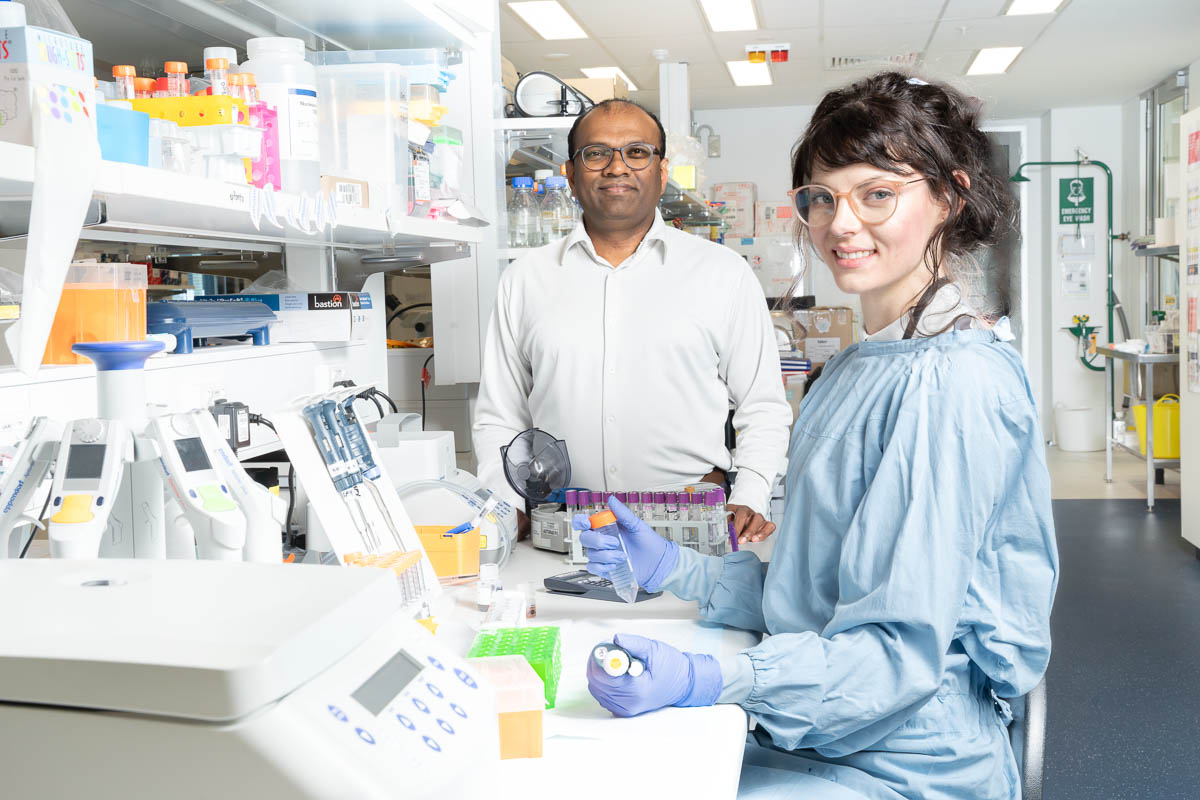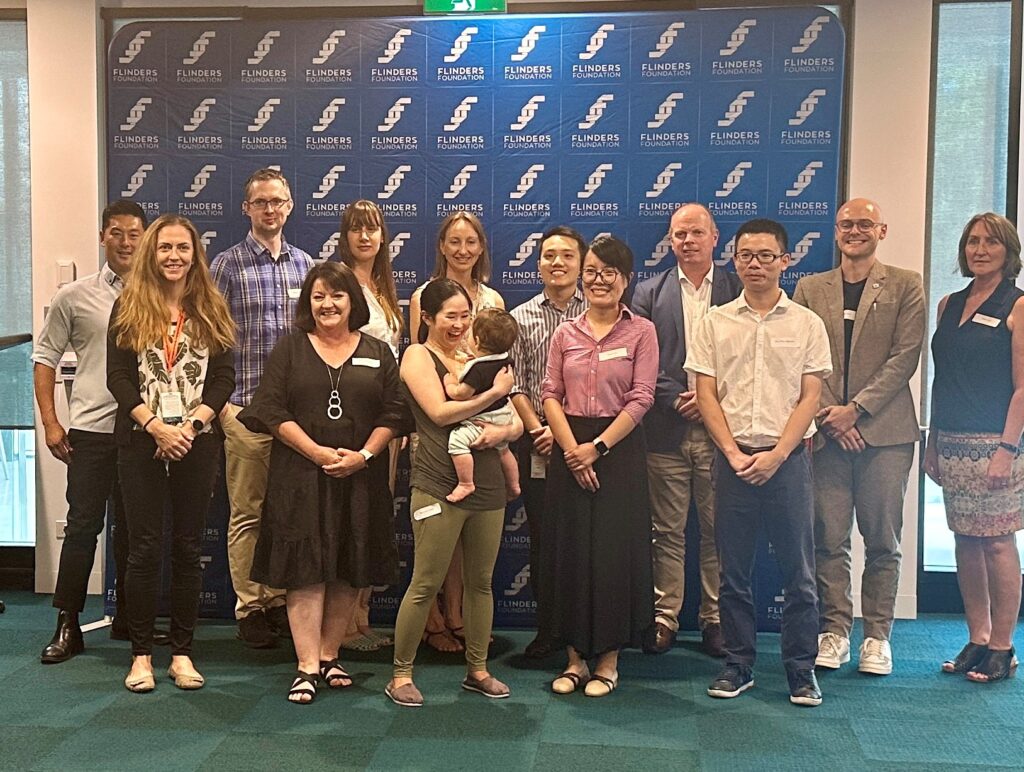
New Flinders Foundation seed funding grants will support important research at the Flinders medical precinct, from cancer, Motor Neurone Disease, mental health, sleep and eye health, through to children’s health, cerebral palsy and gestational diabetes.
31 research project grants totalling $750,000 from the charitable foundation will help fund future health and medical discoveries.
The annual Health Seed Grant Round has been awarded to help researchers advance their knowledge of a variety of illnesses, diseases and social issues in a successful partnership between Flinders Foundation and Flinders University and is funded by donations from generous individuals and funds raised by supporters and organisations.
Research projects include:
- A world-first study analysing patient blood samples to a greater degree than ever before in an effort to detect bowel cancer earlier and at a more treatable stage – ideally before symptoms present. There’s hope this work could lead to development of the first Australian-made blood screening test to detect colorectal cancer (Dr Ganessan Kichenadasse and Geri Laven-Law)
- Development of easier and faster ways to detect treatment effectiveness in Motor Neurone Disease clinical trials (Dr Xuan Luo)
- Investigating whether a commercially available, under-mattress sensor device could revolutionise the way Obstructive Sleep Apnea is diagnosed and managed, opening the possibility of helping more people promptly, and freeing up sleep-laboratory waiting lists (Associate Professor Ching Li Chai-Coetzer)
- World-first research focusing on folic acid in the hopes of tackling rising gestational diabetes rates in Australia (Dr Tanja Jankovic-Karasoulos)
- Exploring how artificial intelligence ‘chatbots’ could help prevent and manage chronic health conditions (Dr Candice Oster)
- Laying the groundwork for a clinical trial exploring a potential new treatment for macular oedema in inherited retinal disease (Professor Justine Smith)

Flinders Foundation Executive Director, Ross Verschoor, said the grants provide researchers with the time and resources they need to prove their concepts and generate data, playing a vital role in helping them to apply for larger grants from national and international funding bodies.
“Flinders Foundation is proud of its seed grant program and the many bold ideas it’s generated and new discoveries it’s led to over the years to improve lives,” says Mr Verschoor.
“It has been rewarding to see many seed grant recipients go on to win grants of a much larger scale, including significant grants through the coveted National Health and Medical Research Council (NHRMC) Ideas Grant scheme.
“We’re grateful to our supporters and the South Australian community for helping to fund the dedicated researchers at Flinders University and the Southern Adelaide Local Health Network who work tirelessly to improve the lives of people and their families affected by a wide range of illnesses, diseases and social issues.”
Flinders University Deputy Vice–Chancellor (Research) Professor Raymond Chan thanked Flinders Foundation’s supporters for their continued commitment to funding new research.
“The support of the Foundation and its generous donors and supporters is vital in helping our talented researchers to work towards saving more lives by detecting early signs of disease and personalising treatments,” Professor Chan says.
“With the help of the Foundation, our research continues to deliver new technologies that can help prevent, diagnose and treat ill health for many individuals, as well as ensuring increased efficiencies in our healthcare system.
“This latest funding will build capacity and expertise in healthcare and technologies, bring new innovations to market and enable people to live healthier, better-quality lives.”
The 31 projects announced today are in addition to $100,000 for four new cancer research grants recently announced to mark World Cancer Day, focusing on ovarian cancer, multiple myeloma and the asbestos-related cancer, mesothelioma, as well as patients living with cancer in conjunction with other chronic health conditions.
View the full list of these exciting projects below and here.
Flinders Foundation Health Seed Grant Round Recipients
Dr Ashleigh Guillaumier – Co-design of a smoking cessation resource for use within Australian lung cancer screening: making the most of a ‘teachable moment’
Dr Ayla Orang – Metformin: A Revolutionary Twist in Targeting Oncogenic RAS Signalling
Dr Bart Eijkelkamp – Controlling dyslipidaemia and liver function during bacterial sepsis
Dr Candice Oster – Interrogating Large Language Models for chatbots to support health behaviour change for prevention and management of chronic conditions: A proof-of-concept study
Associate Professor Ching Li Chai-Coetzer – A Pilot Study to Evaluate the Utility of an Under-Mattress Sensor and Smart Monitoring System for the Diagnosis and Management of Obstructive Sleep Apnea within Primary Care
Dr Christine Mpundu-Kaambwa – Prioritizing Children’s Perspectives: An Exploratory Study on Codesigning a Pictorial Quality of Life Tool (CHU9D) for Children with Cerebral Palsy
Professor Damien Keating – Identifying novel activators of the gut-brain axis to treat mood disorders
Associate Professor Daniel King – Evaluating adolescent health consequences of the SA mobile phone ban in secondary schools
Dr Daniel Thorpe – Paracetamol lowers body temperature and provides pain relief by a novel gut-brain pathway
Dr Duc Phuc Nguyen – A non-contact physiology-based bed sensor system for comprehensive sleep breathing problem detection and management
Dr Feargal Ryan – Does the gut microbiome influence T-cell responses to infant vaccination?
Dr Ganessan Kichenadasse – Hide and seq: Finding new blood biomarkers for early detection of colorectal cancer
Dr Jackie Roseleur – The effect of a cancer diagnosis on chronic disease management and associated health care utilisation and costs in patients with pre-existing chronic conditions
Professor Jamie Craig – Autophagic Flux in Primary Open Angle Glaucoma
Professor Jillian Carr – Assessing the impact of the microbiome on infectivity and shedding, and immune responses to enteric adenovirus in mice
Dr Joanna Murray – Improving acute stroke outcomes in regional South Australia; Implementation of the Screen-Clean-Hydrate bundle of care
Professor Justine Smith – Exploring how interferon-alpha improves macular oedema in inherited retinal diseases
Associate Professor Luke Grzeskowiak – Using real-world evidence to inform policy and practice related to improving the provision of contraceptives in Australian general practice
Associate Professor Matthew Hong – Androgen receptor expression in bladder cancer
Mr Richard Bright – The Impact of Advanced Glycation End Products in T2DM Patients on Biomaterials Fate: Improving Outcomes via Tailored Surface Property Modification
Professor Richard Woodman – Developing a novel pathway for holistic prescribing in multi morbidity using network analysis
Associate Professor Sam Elliott – Drawn in, damaged, then done with: Talented youth footballers’ mental health and wellbeing on the road to the AFL Draft
Professor Sonja Klebe – Precision immunobiology to improve outcomes and predict susceptibility in mesothelioma
Dr Vincent Wong – Unlocking the epigenetic journey of a growing kidney, one cell at a time
Dr Stephen Blake – Can a COVID-19 vaccine be used to turn immunologically cold cancers hot?
Dr Tamina Levy – The Adherence Counselling Toolkit (ACT now); supporting health professionals to support people with stroke to self-manage
Dr Tanja Jankovic-Karasoulos – Decoding Folic Acid Impact on Gestational Diabetes Risk in Australia
Professor Tom Gordon – proteo-genomic profiling of antibodies in health and disease
Dr Xuan Luo – Next-generation diagnostic device for fast, accurate and multiplexed immunoassays to advance motor neuron disease diagnostics
Dr Yee Lian Chew – What makes a memory? Identifying the molecules that boost memory formation
Associate Professor Yogesh Sharma – The characteristics, outcomes and costs associated with preventable readmissions at Flinders Medical Centre
Cancer Seed Grants – Previously announced on World Cancer Day
Dr Charlotte Downes – Defining the roles of Desmoglein-2 and its association with poor outcomes in multiple myeloma
Dr Ash Hocking – Predicting immunotherapy response using patient-derived cancer organoid models
Dr Claire Jessup – Targeting PD1 in ovarian cancer
Dr Emma Kemp – Developing optimal models of care to manage multimorbidity in people with cancer: a clinical pathway co-design study

